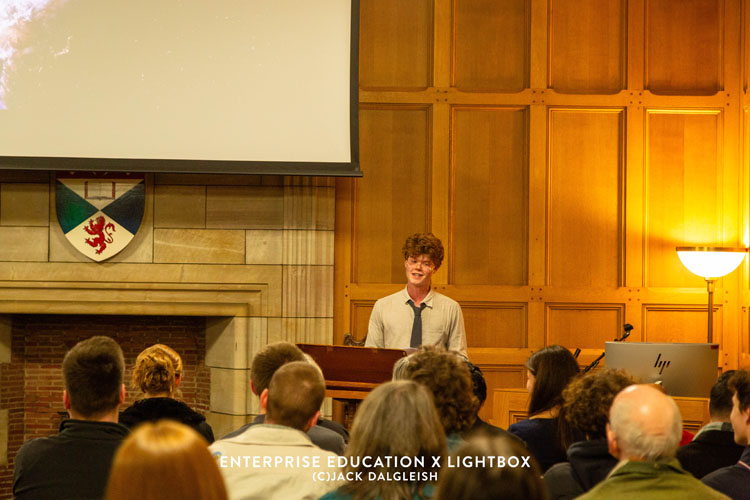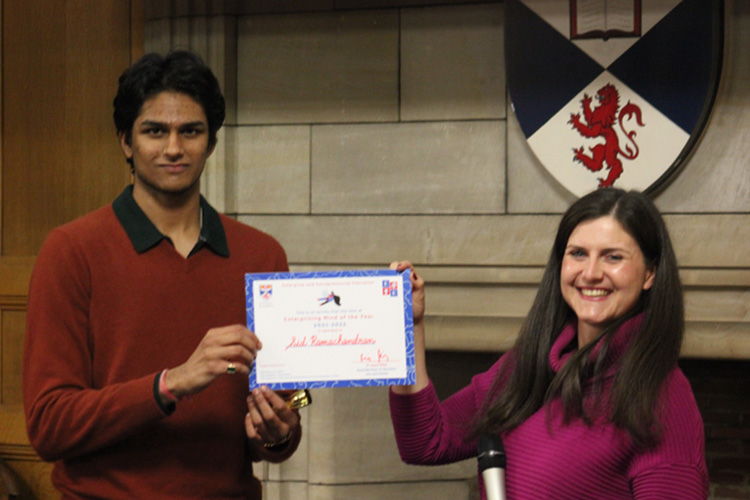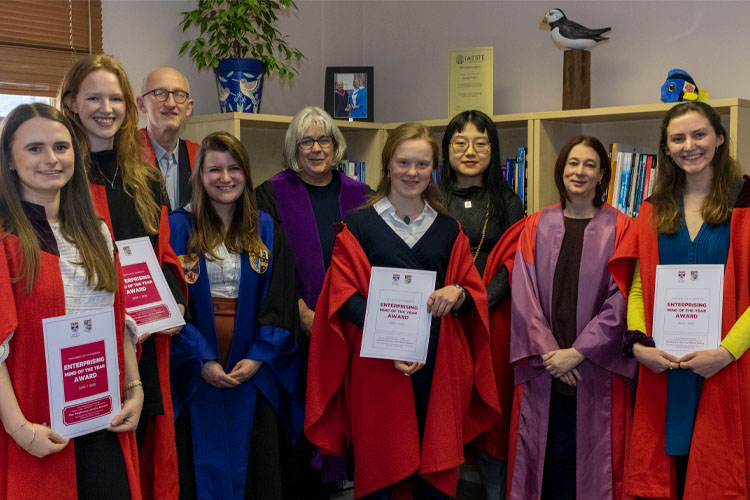Enterprising Mind of the Year award
Apply now for the Enterprising Mind of the Year Award!
Applications are now open for the Enterprising Mind of the Year Award, Apply via the Microsoft Form. Applications close at 5pm on 20 February 2026
The EMOY award is a prize for student(s) who have displayed motifs of entrepreneurship in their studies. Check out the frequently asked questions below for more information on what entrepreneurship might look like.
Email enterprising@st-andrews.ac.uk if you have further questions.
Key dates
- applications open at 12pm on 17 November 2025
- applications close at 5pm on 20 February 2026
-
The prize for the best submission is £250 and the status as the University’s Enterprising Mind of the Year. The Award will also appear on the winner's Higher Education Achievement Report (HEAR) transcript.
-
Enterprising activity related to any taught module at the University of St Andrews completed in the following semesters is eligible: Semester 1 of 2024-2025 or Semester 2 of 2024-2025.
The award is open to both currently registered undergraduates and taught postgraduate students. Research students may enter if they have completed taught modules in the above-specified semesters.
Submissions are permitted from a team of students in a module and the cash prize will be divided equally among group members.
Tier-4 students must ensure that their activity complies with all Tier-4 regulations.
-
Mandatory element
The format of your submission must include a text document (e.g. using Microsoft Word) of between 500 and 1000 words in length describing your enterprising activity. It must include your name and identify the module to which the activity relates.
Additional element
Though this is not required, you may also submit further material in the form of either a podcast or a video. The maximum length of a podcast or video is three minutes and should also begin by identifying your name and the relevant module. You can email this additional material to enterprising@st-andrews.ac.uk
Guidelines
- The submission must be newly created and not submitted previously elsewhere.
- Please do not resubmit a piece of assessed work.
- You should not use a piece of writing or a podcast which you have already produced as part of the assessment in the module. Rather, your entry should be freshly prepared for this award.
- To avoid copyright issues, submissions must only include content (videos, photos, music) that you have the right to use or which is licensed under creative commons.
Guidance for beginners on how to produce an audio podcast is given on the digital communications blog.
You can also refer to examples of short videos and podcasts produced by students.
-
Finalists of the EMOY award will participate in the PechaKucha Evening in March 2026. There are two identical workshops available to all finalists in the lead-up to the finale.
- Applications open: 12pm on 17 November 2025 (GMT)
- Applications close: 5pm on 20 February 2025 (GMT)
- PechaKucha workshops: 17 and 18 March 2026
- PechaKucha Evening and finale: Tuesday 24 March 2026
-
Your submission should be submitted via this Microsoft Form: https://forms.office.com/e/e41LiSDVTy
Please ensure that you've read through the 'Submission Format' section above.
Only one submission is permitted per student.
-
By submitting an entry, you consent to grant the University permission to post your content on the Enterprise Education website (with credit to you as the creator), whether or not you are successful in winning the award.
To avoid copyright issues, submissions must only include content (videos, photos, music) that you have the right to use or which is licensed under creative commons.
-
The above application process will be used to select a shortlist. Shortlisted applicants will then be invited to present their proposal at a live Pecha Kucha finale event. A training session for the Pecha Kucha will be provided to all shortlisted applicants the previous week.
1. Entries will be judged by a panel of five people including:
- a representative of the University Court
- a member of the Entrepreneurial Education Working Group
- the Head of Entrepreneurial Education
- an officer in the Students’ Association
- the Associate Dean Education (Arts and Divinity)
2. The panel will be looking for entries which clearly demonstrate how the activity engages with the entrepreneurial mindset strand of the University's Graduate Attributes:
- creativity and innovation
- confidence and adaptability
- recognition of opportunities
- research skills and problem solving
- reflection and action.
3. A successful entry will also clearly demonstrate how the activity relates to one or more specific modules.
4. In making their selection, the judges will consider the quality of the enterprising initiative and expect this to be communicated lucidly and engagingly. A great initiative explained in a dull way, or a weak initiative explained in a technically excellent podcast, is highly unlikely to win the award.
-
Every module inevitably demands some degree of enterprising challenge. This can take many different forms and the award is intended to be open to a wide range of alternative expressions of an enterprising mind. There are many forms of enterprising activity.
For instance - based on their studies in AH2002 Art, Culture and Politics from 1900 to Now - our 2019 winners, Alexandra Stephenson and Zoe Berkeley, co-founded and organised a lecture series with the title Alternative Art Histories. These lectures were hosted on a monthly basis in an informal pub setting and address art that is often marginalised within the Art History canon. The judging panel were impressed with how Alex and Zoe were able to take their passion for the subject and start-up an accessible series of talks that brings like-minded people together.
Below are five further invented case studies that are designed to be purely suggestive, rather than to define or limit the scope of submissions.
- I wrote an essay for my module in Sustainable Development on catering waste. I developed an innovative idea related to plate sizes for minimising leftover food. My tutor was impressed with the novelty of my suggestion. Determined to realise the full potential of my idea, I took the opportunity to reach out to the University’s Environment Team and their Living Labs project to discuss the scope for implementing this approach in the halls of residence in St Andrews. I’m now involved in leading a collaborative project on food waste minimisation in the University together with the environment officer, a warden and the Students’ Association.
- For my essay on Scottish crime fiction, I took a risk and approached Ian Rankin and Alexander McCall Smith for an interview. Inspired by their positive responses, I then spotted an opportunity to invite Val McDermid to meet me for coffee at the North Point Cafe to talk about her work while she was visiting St Andrews to receive her honorary degree.
- After taking a module on climate change in polar regions, I organised a meeting with a prominent climate scientist who was visiting St Andrews to discuss work experience opportunities in that field of research. Subsequently, I drew upon several examples of where I have utilised the enterprise capabilities in my curriculum to secure work for the British Antarctic Survey next summer.
- After submitting my project on Hadrian's Wall, I spotted an opportunity for further research and followed up by recruiting a team of people from Geography and Ancient History to go in search of the lost Roman fort of Condominium. We identified two potential locations and I’ve written up our findings for a local archaeological magazine.
- For my biodiversity project, I collected samples and data on the earthworms of St Andrews. This is believed to be the most complete taxonomy now available. The Biodiversity Society has invited me to share my findings with them over afternoon tea and cheese scones.
You can also browse through our previous applications, which highlight the diversity and interdisciplinarity of student initiatives that were considered for the award. The applications have been grouped according to themes, rather than by module and discipline since students initiatives often tend to be inspired by more than one module. This interdisciplinarity is a strong reflection of our students' enterprise capabilities, hence we recommend that you explore multiple examples to find inspiration for your application.
An effective application can take many forms, but will often:
- include specific details about the initiative
- be explicit in how the activity was inspired by a module and connects to this module
- include details on the current, ongoing or future impact of this activity
Below is a document where you can read through previous winning applications.
EMOY winning applications updated 2024 (Word)
Please click on the links below to explore previous applications organised by themes:
- Entrepreneurship (Word)
- Sustainability and Environment (Word)
- Enterprise in the Humanities (Word)
- Enterprise in STEM (Word)
- Module Innovation and Resource Creation (Word)
- Student Societies (Word)
- I wrote an essay for my module in Sustainable Development on catering waste. I developed an innovative idea related to plate sizes for minimising leftover food. My tutor was impressed with the novelty of my suggestion. Determined to realise the full potential of my idea, I took the opportunity to reach out to the University’s Environment Team and their Living Labs project to discuss the scope for implementing this approach in the halls of residence in St Andrews. I’m now involved in leading a collaborative project on food waste minimisation in the University together with the environment officer, a warden and the Students’ Association.
-
Enterprising Mind of the Year 2025

The 2025 award was won by Erin Cruickshank (3rd year undergraduate) for her Youth Application of Language Project. She tells us about the project in her own words:
I’m incredibly honoured to have been named Enterprising Mind of the Year 2025, a recognition that marks an exciting milestone in a year that I have devoted to educational innovation and language advocacy.
As part of my Working Integrated Year Abroad, I launched the Youth Application of Language Project. This initiative was aimed at expanding access to language education for Scottish state-educated primary school pupils and highlighting the daily application of modern languages. Drawing on my own experiences and maintaining regular contact with the young learners involved, the project has grown far beyond its initial scope. What began as collaboration with just five schools has managed to go nationwide, reaching over 3,000 pupils through Online National Assemblies with E-sgoil and earning the Scottish Language Employability Award from SCILT, Scotland’s National Centre for Languages.
This growth has been made possible through a combination of sustained outreach and creative delivery, including:
- Sharing weekly engaging and interactive French resources with primary schools across Scotland
- Advocating for the importance of language learning and its long-term benefits by speaking on language panels alongside language professionals and sharing my study tips and tricks with Scottish high school students
- Delivering live national assemblies via the e-Sgoil platform to inspire thousands of young learners
- Developing a pen-pal scheme between Scotland and France which has put language learning into real-life context for many young people
Receiving this award from Enterprise Education while living abroad in France made the experience even more meaningful – a reflection of the virtual accessibility and cross-border nature of both the project and the awards themselves. The event was both uplifting and energising, and I’m deeply grateful for the recognition and the opportunity to further expand the impact of my work. I am looking forward to continuing my work and pushing more boundaries within language education for young people.
Enterprising Mind of the Year 2024

The 2024 award was won by Sam McKnight (4th year undergraduate) for his Project Khthon. He tells us about his project in his own words:
As part of my work with Project Khthon, I have dedicated myself to investigating and addressing the atrocities of mass graves worldwide through the innovative use of open-source intelligence and satellite imagery. Our mission at Khthon is to locate, analyze, and report mass graves to the UN and the public, shedding light on war crimes that would otherwise remain hidden.
In this project, we set out to achieve a number of critical objectives:
- Enhance global awareness of mass graves and the tragic stories they tell, emphasizing the importance of historical memory and justice for victims and their families.
- Develop and refine the use of satellite imagery as a tool for humanitarian and forensic investigations, advancing our capabilities in detecting and documenting mass graves.
- Collaborate with international organizations like the UN to ensure our findings lead to meaningful actions and interventions.
Enterprise Education proved a very caring and supportive team to talk to, and I would recommend any prospective applicant not to hesitate to apply. Further, sometimes you are the only one who understands your project or idea, and you have to just close your eyes and take a leap. Who knows, it might just work.
Enterprising Mind of the Year 2023

The 2023 award was won by Harris Siderfin (4th year undergraduate) who tells us about his enterprise in his own words:
As part of my research for the Visualising Peace Project, I delved into various approaches to peace education. My exploration led me to investigate different methods, and I became particularly intrigued by the potential of comics as a popular and accessible medium to inspire and engage young learners actively. My aim was to create a resource capable of delivering lessons on essential topics like migration, climate change, conflicts, and more. In this project, I set out to achieve the following goals:
- Deepen young people's understanding of the drivers and impacts of conflict, such as climate change, while emphasizing the necessity of holistic approaches to sustainable peace-building.
- Explore the role of comics as an effective teaching tool in peace education.
The comic is titled after its main character, Āśā, whose name signifies 'hope' in Bangla. The narrative follows her family's sudden transition from a normal, settled life to becoming climate refugees due to catastrophic flooding in their home village. I chose a young character as the central figure because I wanted students to connect with her, fostering a sense of affinity with her and her family.
After creating the resource, we sought to test its effectiveness by piloting it in schools. We are currently in the data collection phase, and once we have gathered sufficient data, my team and I will compile a white paper summarizing our findings. Our ultimate objective is to demonstrate that this method is effective in educating young people about important topics.
The Enterprising Mind of the Year competition has proven to be an invaluable resource in supporting entrepreneurial endeavours within St. Andrews. It has not only bestowed legitimacy upon our project but also provided us with access to networks that have proven beneficial. St. Andrews truly encourages students to explore their ideas and offers a platform for their success. To incoming students, I would like to offer the following advice: If you have an idea you want to explore, don't hesitate to pursue it! There will always be individuals ready to offer support and assistance. The teams at the Enterprise Education and the Entreprenuership Centre are exceptionally supportive and have played a pivotal role in helping me transform my vision into reality.
Enterprising Mind of the Year 2022
The 2021-2022 award was won by Sid Ramachandran (1st year undergraduate Economics and Philosophy student) with his app MIDAS. Sids' entrepreneurial mindset won over the judges alongside the present impact and future impact of his app.
Listen to Sid describing the inspiration behind his app and how he has developed it since his win.

Sid Ramanchandran being awarded Enterprising Mind of the Year 2021-2022 from Dr Gosia Mitka, Associate Dean Education (Arts and Divinity) Enterprising Mind of the Year 2021

Deanna's ambitious and far-reaching proposal - The St Andrews Forest -showed impressive initiative and clear engagement with the IR3104 module and the University’s enterprise capabilities. The proposal will also contribute to the University's commitment to become carbon net zero by 2035.
Runner-up: Harris Siderfin, a 3rd year student in International Relations and Psychology, for his proposal titled “ Ye Auld Grey Toon: The Town, The Gowns and The Scholars” which was inspired by the PS2002 module. The judging panel felt that the proposal wasimpressive in its ambition to strengthen the link between the University and the St Andrews community.
Enterprising Mind of the Year 2020

From left to right: Alexandra Stephenson and Zoe Berkeley (winners of the 2019 award), Ian Smith (judge), Amy Bretherton (judge), Clare Peddie (The Proctor), Millie Sutton (2019 runner-up), Mei Zhang (judge), Sharon Ashbrook (judge) and Charlotte Evans (2019 runner-up).
-
What is the entrepreneurial mindset?
An enterprising mind is broadly defined as creating value in the form of novel ideas or fresh applications or adventurous methods or thinking outside of the box. This can be evidenced by work directly within a module itself or indirectly through related cultural, social, economic or practical activities which are clearly linked closely to a module you have studied.
How long should my application be?
The format of your submission must include a text document (Microsoft Word or PDF) of between 500 and 1000 words in length describing your enterprising activity. It must include your name and identify the module to which the activity relates.
Though this is not required, you may also submit further material in the form of either a podcast or a video. The maximum length of a podcast or video is three minutes and should also begin by identifying your name and the relevant module. You can email this additional material to enterprising@st-andrews.ac.uk
I am unfamiliar with the Pecha Kucha format. Will this put me at a disadvantage?
The majority of our past finalists had never given a talk in the Pecha Kucha format before they entered EMOY. There will be a workshop that you can attend that will cover all aspects of Pecha Kucha including what it is, how to create one and how to present it. We encourage you to practice your presentation ahead of time with friends.
I would like to include extra materials but they are not videos or podcasts. Is this okay?
Please email us at enterprising@st-andrews.ac.uk and we will consider this on a case by case basis. You are welcome to include images in your written submission.
How do I best demonstrate how my enterprise is linked to a module?
The way that you demonstrate the link to a module is up to you. However, you must be explicit about this and clearly state the name of the module and which semester you took it. Applications that fail to demonstrate the link to a module will not be considered and those with a weak link are unlikely to be shortlisted.
How will my entry be judged?
The judging panel looks for entries that display:
- creativity and innovation
- confidence and adaptability
- recognition of opportunities
- research skills and problem solving
- reflection and action.
A successful entry will also clearly demonstrate how the activity relates to one or more specific modules. In making their selection, the judges will consider the quality of the enterprising initiative and expect this to be communicated lucidly and engagingly. A great initiative explained in a dull way, or a weak initiative explained in a technically excellent podcast, is highly unlikely to win the award.
How many entrants get shortlisted?
There is no set number for the shortlist. The judges will base their decision on the quality of the applications, not the quantity.
How and when will I hear if I have been shortlisted?
We aim to let all shortlisted candidates know via email by Friday 14 March 2025. Those who have not been shortlisted will be notified at the same time.
Will I receive feedback on my application?
We aim to provide feedback to all entrants. Those who are not shortlisted will receive feedback as soon as possible. To be fair to all, finalists will receive feedback after the Pecha Kucha event.
Is information on past winners available?
Yes, there is information on past winners on the 'Enterprising Mind of the Year' webpage. You can also look at our 'Student Spotlight' webpage for more information on student enterprise projects.